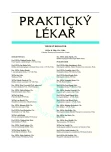Czech inhabitants’ opinions on using antibiotics and other drugs
Authors:
T. Kopřivová Herotová 1; J. Beneš 2; V. Hynčica 3
Authors‘ workplace:
3. lékařská fakulta UK v Praze
Ústav zdraví dětí a mládeže
Přednosta: doc. MUDr. Dagmar Schneidrová, CSc.
1; Klinika infekčních nemocí 3. LF UK
Fakultní nemocnice na Bulovce, Praha
Přednosta: doc. MUDr. Jiří Beneš, CSc.
2; Státní zdravotní ústav, Praha
Ředitelka: Ing. Jitka Sosnovcová
3
Published in:
Prakt. Lék. 2010; 90(9): 526-532
Category:
Of different specialties
Overview
Bacterial resistance to antibiotics remains one of the key problems in community and hospital settings throughout whole world. The increased number of resistant strains correlates with an increasing consumption of antibiotics. In the community, both physicians and patients are responsible for the worsening trend. Data from the international literature suggest that patients are able to put pressure on their physician for an antibiotic prescription even in cases where the physician deems it not necessary or suitable. In order to understand better habits in our country, we questioned 1242 adult respondents in the Czech Republic in 2008. Our results show that people in the Czech Republic are not adequately informed about infections and antibiotics. Nevertheless, the people mostly respect their physician, and accept his/her decision and do not force him/her to antibiotic prescription. Only 13% of respondents would like to buy antibiotics without medical prescription and 95% agree with mandatory vaccination against most serious infections. A sophisticated system of medical postgradual education works in the Czech Republic but we also need public education, which should preferentially be addressed to school children and their parents.
Key words:
antibiotics, resistance, compliance, e-Bug.
Sources
1. Kolář, M., Urbánek, K., Lochmanová, J. Výchozí zdroje racionální antibiotické léčby bakteriálních infekcí. Praktické lékárenství 2006, 1. s. 20-23.
2. Braun, B.L., Fowles, J.B. Characteristic and experience of parents and adults who want antibiotik for cold symptoms. Arch. Fam. Med. 2000, 9(7), p. 589-595.
3. Palmer, D.A., Bauchner, H. Parents´and physicians´view on antibiotics. Pediatrics 1997, 99(6), E6.
4. Mangione-Smith, R., McGlyn, E.A., Elliott, M.N. et al. Parent´s expections for antibiotics, physician-parent communication and satisfaction. Arch. Pediatr. Adolesc. Med. 2001, 155, p. 800-806.
5. Bartlett, J.G. Management of Respiratory Tract Infections. Baltimore: Lippincott Williams and Wilkins, 2nd ed. 1999, p. 260.
6. Marešová, V. Infekce dýchacích cest v komunitě – diagnostika a léčba. Vox Pediatrie 2002, 9, s. 14-19.
7. Marešová, M., Urbášková, P., Jindrák, V. Aktuální pohled na léčbu respiračních infekcí. Practicus 2002, 1(1), s. 5-10.
8. Štika, L. Spotřeba anitimikrobiálních léčiv a jejich vliv na rezistenci mikroorganismů. Klin. Mikrobiol. Inf. Lék. 2001, 7(3), s. 66-71.
9. Urbášková, P. Trendy rezistence na antibiotika u některých původců komunitních infekcí v ČR. Pediatrie pro praxi 2000, 1(3), s. 105-107.
10. Urbášková P. Surveillance rezistence k antibiotikům u nejčastějších bakteriálních původců respiračních infekcí v České republice. Remedia 2000, 10(3), s. 195-203.
11. Urbášková, P., Jindrák, V., Marešová, V. Antibiotická rezistence u hlavních původců bakteriálních infekcí v ČR. Lege artis, 2001, 1(9), s. 5-7.
12. Barden, L.S., Dowell, S.F., Schwartz, B., Lackey, C. Current attitudes regarding use of antimicrobial agents: results from physician´s and parents´focus group discussions. Clin. Pediatr. (Philadelphia) 1998, 37, p. 665-571.
13. Cunha, B.A. Clinical relevans of penicillin-resistant Streptococcus pneumoniae. Semin. Respir. Infect. 2002, 17(3), p. 204-214.
14. Kopřivová Herotová, T., Beneš, J. e-Bug: Evropský vzdělávací program pro žáky prvního a druhého stupně základních škol zaměřený na prevenci antibiotické rezistence a zlepšená hygienických návyků. Hygiena 2009, 54(4), p. 127-129.
15. Urbášková, P. a Pracovní skupina pro monitorování rezistence bakteriálních patogenů: Surveillance rezistence k antibiotikům u nejčastějších bakteriálních původců respiračních infekcí v České republice. Remedia 2000, 10, s. 195-203.
16. e-Bug: www.e-bug.eu.
Labels
General practitioner for children and adolescents General practitioner for adultsArticle was published in
General Practitioner

2010 Issue 9
- Advances in the Treatment of Myasthenia Gravis on the Horizon
- Hope Awakens with Early Diagnosis of Parkinson's Disease Based on Skin Odor
- Memantine in Dementia Therapy – Current Findings and Possible Future Applications
- Memantine Eases Daily Life for Patients and Caregivers
- Possibilities of Using Metamizole in the Treatment of Acute Primary Headaches
-
All articles in this issue
- Evolution and evolutionary theory for physicians. IX. Evolutionary psychology
- Benefit of new recommendations for evaluating 12-lead ECG in athletes for general practitioners
- Spondylodiscitis – known and unknown
- Czech inhabitants’ opinions on using antibiotics and other drugs
- Care for women at middle and advanced age from the point of view of a midwife
- Nutritional assessment of hospitalized elderly people
- Preoperative treatment of a diabetic patient
- Change in the number of stroke patients in the Czech Republic following an increase in the thrombolytic treatment window from 3 to 4.5 hours
- Shopping addiction as a problem
-
Duplicitní malignita s paraneoplastickou polymyositidou
Kazuistika a přehled problematiky
- General Practitioner
- Journal archive
- Current issue
- About the journal
Most read in this issue
- Spondylodiscitis – known and unknown
- Preoperative treatment of a diabetic patient
- Nutritional assessment of hospitalized elderly people
- Shopping addiction as a problem
